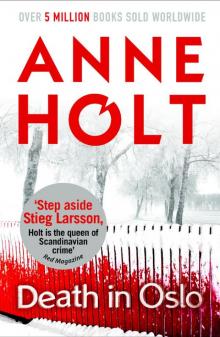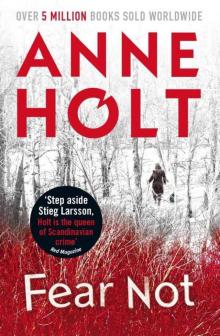Dead Joker Read online
Page 5
There had not been space for a story about a tennis ball with threatening tentacles that lay somewhere inside Cecilie’s stomach. There had been no space for Cecilie at all on this short, shivery spring evening.
Hanne was snoring softly.
Suddenly she moaned and flipped over toward Cecilie, her mouth open and her face upturned. Her right leg had settled along the back of the settee, and her left arm was hanging helplessly just above the floor. She looked uncomfortable. Cecilie put Hanne’s arm back carefully alongside her body, before pouring herself some more water.
Hanne’s fringe was too long, concealing one of her eyes. Her brown hair had developed faint traces of gray, and Cecilie was surprised not to have noticed this before. The lashes on her one visible eye twitched, the minuscule movements indicating that Hanne was dreaming. One corner of her mouth filled with spittle, which slowly formed a dark stain on the cushion under her cheek.
“You look so small,” Cecilie whispered. “I wish you could be a bit smaller.”
The doorbell rang.
Cecilie was startled. Hanne Wilhelmsen did not move. Afraid that the doorbell would chime again, Cecilie rushed to the front door and snatched it open.
“Billy T.!” she exclaimed, realizing how long it had been since she’d experienced such instant, simple pleasure at seeing someone. “Come in!”
Then she hushed him by putting a finger to her lips.
“Hanne’s sleeping on the settee. We can sit in the kitchen.”
Billy T. peered into the living room.
“No,” he said firmly, crossing the room and moving the coffee table in order to get closer.
Billy T. lifted Hanne Wilhelmsen as if she were a child who had fallen asleep in the middle of a forbidden thriller on TV. Her weight felt comfortable against his ribcage. The faint scent of wine on her breath combined with day-old perfume prompted him to kiss her on the forehead without a moment’s thought. Cecilie opened the doors, and Billy T. managed to put Hanne to bed without her showing any sign of waking up.
“I’ve never come across that in a grown-up,” Billy T. said softly as he stood scrutinizing Hanne while Cecilie tucked the quilt around her. “Not waking when they’re carried, I mean.”
Cecilie smiled, gesturing that they should leave.
“Something’s bothering that dame,” Billy T. said, staying put. “Do you know what it is?”
Cecilie Vibe tried to avoid his eyes. They were too blue and familiar and saw too much. Cecilie wanted to leave the bedroom, step away from the sleeping Hanne and the stuffy smell of bedclothes and sleep. She wanted to go to the living room, open another bottle of wine, talk about films they hadn’t seen and guest lists and what the new baby was going to be called. She did not succeed in moving a muscle. When she finally raised her head, he was the one who pulled her close.
“What in the world is it with you two?” he whispered, putting his arms around her. “Are you having a crisis, or what?”
Billy T. sat with Cecilie until almost four o’clock on Saturday morning. When he left, Cecilie felt a prick of conscience that Hanne had not been the first to know. At the same time, she felt relieved and filled with something almost resembling optimism as she solicitously undressed Hanne before snuggling underneath the quilts herself.
“I think I’ll sell the Harley,” Hanne murmured, half asleep, cuddling up close to her. “It’s about time I grew up.”
10
Chief Public Prosecutor Sigurd Halvorsrud looked in remarkably good shape. His clothes were clean and his shirt freshly ironed. A diamond set in white gold glittered on his red-and-green tie. Only the suggestion of a slapdash shave said something about his current circumstances. His complexion was clear and his color surprisingly good for the time of year. His entire appearance might have seemed offensive to souls more delicate than Billy T., given that his wife had been murdered two days earlier and he himself was charged with her homicide.
However, there was something about the eyes.
They were bloodshot and completely lifeless. Although the man made an effort to retain some kind of dignity in the way he sat – very straight, and with the somewhat renowned jutting of the chin – he was betrayed by the look of despair in his eyes, which he tried to keep to himself.
Billy T. ran his fingers around the inside of two cups before filling them with coffee from a pump-action thermos flask.
“Black?”
“With sugar, please.”
The Public Prosecutor’s fingers were steady as he helped himself to two sugar lumps from a cardboard box. Billy T. took one himself and dipped it in his coffee before popping it between his lips.
“Karen Borg will be here shortly,” he said, sucking the sugar lump noisily. “Should we wait for her, or just make a start right away?”
“We can start,” Halvorsrud said, clearing his throat quietly. “If she’s just around the corner, so to speak.”
“This Ståle Salvesen,” Billy T. began, taking a slurp of coffee to wash down the remains of the sugar. “How do you actually know the guy?”
Confused, Halvorsrud looked at Billy T. “But,” he said, thumping down his coffee cup, “I was told he’s dead. He … From what I understand, he committed suicide. So why are you asking?”
Billy T. helped himself to two more sugar lumps, dipped them in his cup and placed them on his tongue. “We don’t have a body yet,” he said as he sucked them. “Plus, I understood from Hanne Wilhelmsen you’re quite insistent that it was Ståle Salvesen who killed your wife. So you say. So I’m asking you about Ståle Salvesen. Okay?”
Halvorsrud ran his hand over his scalp, just visible through his thin, grayish-blond hair. It looked as though he doubted the value of continuing to assert that a dead man had killed his wife while he had sat there watching. It looked as though he doubted most things.
“I don’t understand it,” he said, trying to swallow a belch with his fist against his mouth. “Excuse me. Of course you don’t believe me. But I know it was Ståle Salvesen who stood there in my living room. He was there—”
He raised his cup to his lips and swallowed twice, striking himself on the breastbone and excusing himself yet again.
“Ståle Salvesen was there for some time. It’s difficult to say how long – you lose your sense of time under such circumstances. Or so I assume. At least I did. But I’m in no doubt that it was him. He—”
“But how did you know that?” Billy T. interrupted. “How do you know a guy on disability benefit who lives in a local-authority apartment in Torshov?”
Karen Borg entered the cramped office and stared in surprise at the policeman.
“Billy T.,” she said sharply, “I thought Chief Inspector Wilhelmsen was to—”
“Sleeping,” Billy T. said with a smile. “You have been too, I see! Busy morning with the children?”
Karen Borg smoothed her hair shamefacedly, attempting to brush away a splash of chocolate spread from her taupe-colored skirt. The stain simply grew larger. She stared at it momentarily, sighing softly, before sitting on the empty chair without opening her folder of documents.
“How far have you got, then?” she said with a strained smile.
“I’m attempting to find out how Halvorsrud knows a solitary man whose income is less than fifty thousand kroner.” Billy T. yawned. “It’s not so easy, I tell you. Do you want a Pepcid tablet, Halvorsrud?”
He fished out two loose tablets from a box of paper clips.
“Thanks,” the Public Prosecutor muttered as he swallowed them both with a gulp of coffee.
The whump-whump of a helicopter circling low over the city forced its way into the room. Billy T. leaned over to the window and squinted up at the sun. For the first time in several weeks, it was making a half-hearted attempt to thaw the wintry, frozen streets of Oslo, but that did not last long. The yellow chink in the sky retreated behind a heavy gray cloud, and the helicopter disappeared in a westerly direction.
“Ståle Salvesen was once a v
ery successful businessman,” Halvorsrud said aloud, glancing at his attorney. “In the eighties. He was chief executive of a promising IT company, Aurora Data. Salvesen was a typical entrepreneur, you might say. No education at all, but knew everything there was to know about software. In fact, for a while Aurora Data was in danger of being bought up by Microsoft. Since Salvesen was the majority shareholder, that did not materialize. He wanted to run the whole show himself. The guy had vision, I’ll grant him that. The company was ahead of its time, and had developed a—”
Halvorsrud scratched the back of his hand before finally directing his gaze at Billy T.. “I don’t know much about that kind of thing. I knew it all then, of course, but I don’t remember it so precisely. It was something or other to do with the Internet, in any case. A … browser? Have I recalled that correctly?”
He gave a slight shrug and examined a chip in the table in front of him. His finger ran to and fro across the rough surface.
“Then came the financial crisis at the end of the eighties. New companies, quite successful until then, toppled like dominoes. Aurora Data found a way through, oddly enough.”
“Why do you say that?” Billy T. asked. “You said yourself the company was on a sound footing.”
“Not sound, exactly. Impressive. Promising. Enormous potential. But even all that was no guarantee against catastrophe. That Aurora survived all the same was due first and foremost to a breakthrough with another software program. As far as I remember, it was specially designed for news editors – television, radio and the press. Then Aurora was listed on the stock exchange.”
Billy T. was a man who basked in his own weaknesses. The colossal figure bragged about everything he could not do or did not know. He never apologized for asking for explanations about the most obvious things. When TV journalist Anne Grosvold became queen of the screen, turning her trademark hard-hitting naivety into a widely admired art form, Billy T. had hung a color photo of her on his noticeboard. There she stood, buxom and bright, with her arms flung wide as though bestowing her blessings upon Billy T. and his increasingly audacious trumpeting of his own self-declared lack of knowledge. There was only one thing he refused to admit: he did not have a clue about finance.
Billy T. had only a vague idea about what it meant to be listed on the stock exchange. He grabbed a pen from a lidless cola can and noted down the expression on a pink Post-it note.
“Okay,” he said impassively, biting the tip of the ballpoint pen. “And then?”
“Being listed on the stock exchange involves a great deal. Increased supervision, for one thing. More attention, you might say. From the outside world.”
Until that point, Billy T. had listened with lukewarm interest. Ståle Salvesen was a subject that had to be aired but would most probably be tucked away in a closet once the job was done. Ståle Salvesen was a pathetic recipient of state benefits who was dead into the bargain, and Halvorsrud was not telling the truth. But now it looked as if there was something there. Salvesen had a history. He had not always lived in a two-room apartment with four items of food in the fridge. Ståle Salvesen had been cock of the walk at one time, only a decade ago.
“Ten years isn’t long,” Billy T. said absent-mindedly.
“I beg your pardon?”
“Continue.”
“I got to know Ståle Salvesen in 1990. That is to say …” Halvorsrud took out a pack of cigarettes and held it up to Billy T., seeking permission.
“Smoke away,” Billy T. mumbled, without consulting Karen Borg.
“I didn’t exactly get to know the man. In fact I’ve never met him. But he was charged in an ugly case. Insider dealing. And more.”
Billy T. scribbled down “ins. deal” on the pink note and poured himself more coffee.
“Salvesen’s son – I’ve forgotten his name – at that time was studying economics in the USA.” Halvorsrud pressed on. “He made an extremely favorable and very considerable purchase of shares in a company of which his father was chairman of the board. Not …” He emphasized the word. “… not Aurora Data. Another company. Immediately after the share acquisition – only a matter of days – it came to light that the company had made a lucrative deal with a multinational based in America. The shares suddenly doubled in value. That’s when we entered the picture.”
“Økokrim, which investigates financial crimes,” Billy T. commented.
“Yes. I had just taken up a post there.”
For the first time, Billy T. could discern the suggestion of a smile on the Chief Public Prosecutor’s face. Halvorsrud had swum against the tide. After many years as a successful commercial lawyer, an expert in tax and company law and therefore in how to make money, he had made a clean break and entered the public sector. From earning around five million kroner a year, he had taken his unique skills and used them to investigate financial crimes, for remuneration that, to Halvorsrud, must have seemed like buttons and beads. Above the desk in his office hung a brass plate he had received as a gift from the colleagues he left behind, engraved: “It takes one to know one.”
“We started to dig. And we found things. When you begin to investigate someone who has worked his way up from nothing to riches in only seven years, there’s almost no limit to what you can find. Irregularities. Violations of the law.”
“How much did he get, then?”
“Get?”
“Yes,” Billy T. said impatiently. “How much jail time did he get?”
Halvorsrud smiled again, a stiff-necked, almost scornful sneer.
“We never brought a prosecution.”
Billy T. was about to point out how untenable it was for the Public Prosecutor to spread spiteful gossip about a dead man only to admit that the case never became serious enough to end up in court. Then he checked himself. More times than he wanted to remember, he had been in a similar situation himself. Guilt was obvious, but evidence slight.
“Which doesn’t mean the man was innocent,” Halvorsrud added, as if Billy T. had been thinking aloud. “It’ll always be my opinion that Ståle Salvesen should have been convicted. But—”
“Fine,” Billy T. said. “Understood. Been there myself. But things didn’t go particularly well for Salvesen even so, then? Something must have happened, I mean. From a four-wheel drive to a push-bike in barely ten years …”
“Haven’t the foggiest idea,” Halvorsrud said tartly. “The case was shelved because of the evidence position in 1996. By then it had been … Well, we hadn’t done much with it in the previous few years, as it were.”
Billy T. did not make any effort to conceal a long-drawn-out yawn, and his jaw cracked. He let rip a stifled fart, hoping no one noticed. To be on the safe side, he leaned over to the window and opened it a notch.
Cases like Salvesen’s were common. An almighty commotion for six months or so. The police upending every stone and turning every tiny scrap of information inside out, before the whole thing petered out slowly and quietly. The folder would be left lying at the bottom of a pile somewhere, the only reminder the occasional contact from a brash lawyer working himself into a frenzy on behalf of his client. In the end, the case would be dug out again, get stamped and signed with the code indicating the matter was being dropped, and then be consigned to the archives.
“When did you stop working on the case?” Billy T. asked.
“Sorry, don’t remember. In 91, maybe? Don’t really remember.”
“In 1991,” Billy T. repeated. “And the decision not to prosecute didn’t come until 96. What did Salvesen do in the meantime?”
“As I said, I don’t know.”
“How did you recognize him?”
“Recognize him?”
“You say you’ve never met the guy, but all the same you’ve no doubt it was Ståle Salvesen who killed your wife. How—”
“The newspapers,” Halvorsrud interrupted in a dejected voice. “The case was given due mention. Besides, I had seen pictures of him before then as well. As I’ve now told you repeat
edly, the man was a success. He had grown older, of course, somewhat … thinner, perhaps? His hair, at least. But it was him.”
“Did he say anything?”
“When he murdered my wife?”
Halvorsrud’s voice momentarily turned falsetto. He swallowed noisily, shaking his head faintly as he peered inside his coffee cup. It was empty. Billy T. showed no sign of offering him more.
“He didn’t say anything, in fact,” Halvorsrud continued. “Not a word. One minute the lights went off, and the next, Salvesen was standing in the living-room doorway aiming a gun at both of us. A revolver. Or … a pistol. Yes, it was a pistol.”
He shivered, and Karen Borg reached for the coffee thermos.
“Would you prefer water, perhaps?” she asked softly.
The Chief Public Prosecutor shook his head ever so slightly, and produced another cigarette. He sucked the filter end frantically, and his left foot tapped the table leg in a nervous, monotonous rhythm.
“And then?”
“Then he forced me down into the chair. The barrel chair. My wife tried to talk to the man, but I … I said very little, I think. It was as if … When he grabbed the sword, I passed out for a second or two. I think. I don’t really remember … I—”
“How detailed do we need to be, Billy T.?” Karen Borg fingered the chocolate stain, her gaze switching between the policeman and the Chief Public Prosecutor.
Billy T. stretched out to close the window. The helicopter had returned. The rotor blades were spinning at an angle as it flew low over the harbor basin at Bjørvika, then it tilted back and accelerated rapidly toward Police HQ at Grønlandsleiret 44. There was a deafening racket overhead. Then the noise slowly dwindled as the helicopter finally decided on a northerly course.
“What do you think about the new opera house, Halvorsrud? Should it be located in Bjørvika or Vestbanen?”
Halvorsrud stared at Billy T.. Something resembling rage had rekindled in his dull gray eyes.
“I beg your pardon?”
“For my part, I don’t really care. Opera’s best on CD. We’ll go into all the details. Right down to the most minuscule facts you can think of.”

 A Grave for Two
A Grave for Two Dead Joker
Dead Joker Death of the Demon: A Hanne Wilhelmsen Novel
Death of the Demon: A Hanne Wilhelmsen Novel Punishment aka What Is Mine
Punishment aka What Is Mine Beyond the Truth
Beyond the Truth Death in Oslo
Death in Oslo The Blind Goddess
The Blind Goddess What Never Happens
What Never Happens 1222
1222 In Dust and Ashes
In Dust and Ashes Odd Numbers
Odd Numbers What is Mine
What is Mine What Dark Clouds Hide
What Dark Clouds Hide Blessed Are Those Who Thirst
Blessed Are Those Who Thirst Fear Not
Fear Not No Echo
No Echo Hanne Wilhelmsen - 01 - The Blind Goddess
Hanne Wilhelmsen - 01 - The Blind Goddess